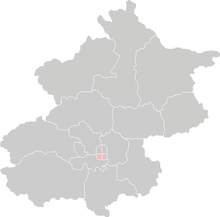| Xuanwu 宣武区 | |||||||
|---|---|---|---|---|---|---|---|
| District of the People's Republic of China | |||||||
| 1952–2010 | |||||||
 Location of Xuanwu on Beijing. | |||||||
| History | |||||||
• Established | 1952 | ||||||
• Disestablished | 2010 | ||||||
| |||||||
| Today part of | Part of Xicheng District | ||||||

Xuanwu District (Chinese: 宣武区; pinyin: Xuānwǔ Qū) was a district of the Municipality of Beijing, China. It was located southwest to the city center, outside of Xuanwu Gate. The district was merged into Xicheng District in July 2010.
Located outside the Imperial Inner City and predominantly reserved for the lower class, the district was over 16.5 km2 in size. Although historically considered a wealthy area of Beijing as one of the older districts of the former Imperial City, Xuanwu District underwent rapid changes in its recent history leading up its merger into Xicheng District. The area was also the birthplace of Peking Opera and housed the Caishikou Execution Grounds during the Qing Dynasty.
Xuanwu District had a large Muslim population.
Popular destinations in Xuanwu District include:
- Niujie Mosque
- Fayuan Temple
- Liulichang—an antiques market
- Huguang Guild Hall